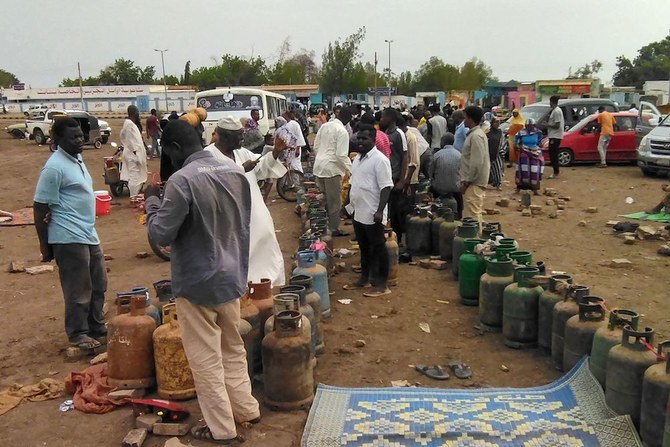
- ARAB NEWS
- 04 Jul 2025

JUBA, South Sudan: The conflict in Sudan has left a trail of devastation, with thousands of lives lost and the country’s stability hanging by a thread. Various international actors have attempted to mediate and find a peaceful solution, but with limited success.
In light of these challenges, African regional bodies have emerged as potential interlocutors capable of fostering peace. But opinion is divided among analysts over the suitability of these institutions and their likelihood of success.
Experts suggest the African Union’s successful mediation in the war in Ethiopia in early November last year provided a compelling precedent for an African-led effort to resolve the crisis in Sudan.
Another body many are looking to for solutions is the Intergovernmental Authority on Development, or IGAD — an eight-member trade body headquartered in Djibouti, of which Sudan is a member.
On June 12, IGAD held its 14th Ordinary Session of the Assembly of Heads of State and Government in Djibouti, with Malik Agar, deputy chairman of the Transitional Sovereignty Council of the Republic of Sudan, acting as chair.
In its final communique, IGAD’s members outlined a road map for peace in Sudan, which committed a quartet of countries, including Djibouti, Ethiopia, Kenya and South Sudan, to a series of action points.
Within 10 days of the road map’s adoption, the quartet chaired by Kenya is committed to arranging a face-to-face meeting between Abdel Fattah Al-Burhan, head of the Sudanese Armed Forces, and Mohamed Hamdan “Hemedti” Dagalo, leader of the paramilitary Rapid Support Forces, in one of the region’s capitals.
The quartet is also tasked with securing a commitment from the leadership of the SAF and the RSF to establish a humanitarian corridor within two weeks of the road map’s adoption and to initiate an inclusive political process toward a political settlement of the conflict within three weeks.
However, the chances of the quartet meeting such tight deadlines are low. According to one Sudanese official who spoke to the AFP wire agency on Tuesday, Al-Burhan has ruled out the possibility of talks with Hemedti.
The Sudanese government official, who was not authorized to speak to the media, said: “In the current circumstances Al-Burhan will not sit at the same table as Hemedti.”
Furthermore, Sudan has reportedly rejected Kenya’s chairmanship of the quartet, citing Nairobi’s alleged alignment with the RSF. Sudanese officials reportedly prefer South Sudan’s President Salva Kiir Mayardit to chair.
The Sudanese delegation also expressed disagreement with certain paragraphs in the final communique.
The IGAD assembly took place shortly after the suspension of the Jeddah talks — the ceasefire effort facilitated by Saudi Arabia and the US — due to a perceived lack of seriousness from the parties involved.
During the assembly, Sudan’s Agar, who assumed the role following the dismissal of Hemedti on May 19, highlighted the urgency of a serious peace process under the auspices of the IGAD road map.
He said the involvement of the African Union, alongside the UN and all key stakeholders involved in Sudan’s peace process, would be vital, calling for the provision of the necessary technical and political support from these partners.
To avoid complications, Agar called for the consolidation of all existing mediation initiatives. At this stage, the focus should not be on political processes or power agreements, he added.
Deng Dau Deng Malek, the acting minister of foreign affairs of South Sudan, also emphasized the crucial role IGAD could play in bringing the conflict in Sudan to a close.
“The primary focus of this road map is to establish a ceasefire, prioritizing the immediate cessation of hostilities between the conflicting parties,” Malek told Arab News.
However, not everyone is convinced African institutions are up to the task, having frequently faced accusations of sluggishness and inefficiency when it comes to dealing with the continent’s myriad challenges.
Speaking to Arab News, Brian Adeba, deputy director of policy at The Sentry, an organization that tracks corruption and human rights violations in Africa, accused African bodies of failing to take “meaningful actions amid significant ceasefire violations as well as obstruction, which has emboldened spoilers on all sides and led to a spiraling of the conflict.”
Fidel Amakye Owusu, a security analyst, likewise cast doubt on the “effectiveness” of IGAD. He told Arab News that only Kenya, with its recent democratic transfer of power and commitment to democratic principles, had the moral authority to represent the democratic forces in Sudan.
However, other analysts suggest the leaders of African states that have recently emerged from their own bouts of conflict could be well placed to assist with the negotiations between Sudan’s warring parties.
“Their respective backgrounds in the military and firsthand experience of war makes them good peace brokers,” Akol Miyen Kuol, a South Sudanese expert based in Nairobi, told Arab News.
South Sudan’s Kiir Mayardit, “in particular, is capable of convincing the rival leaders to seek peace,” Kuol added.
Even if the timing is wrong, an African solution to an African crisis could still be the right strategy. According to Ahmed Khair, a Sudan-based security expert who also spoke to Arab News, “these regional blocs have already yielded positive results in the mediation process.”
However, Khair said any such talks must not get bogged down in political rhetoric or become detached from the realities on the ground.